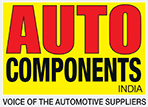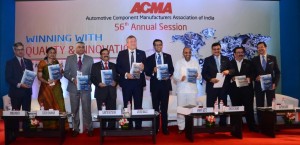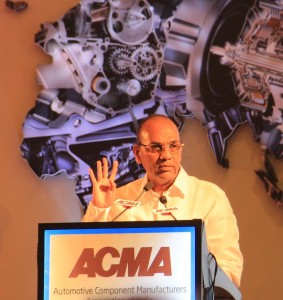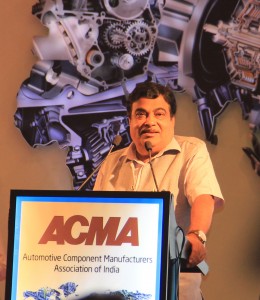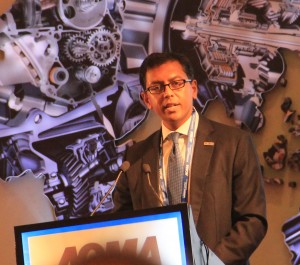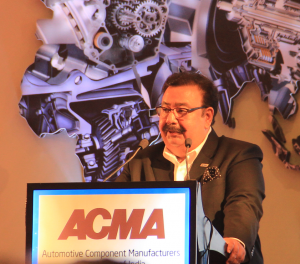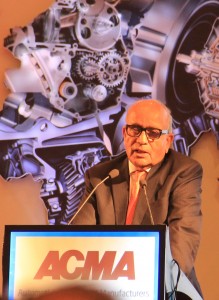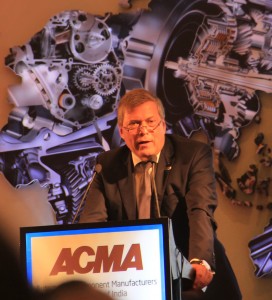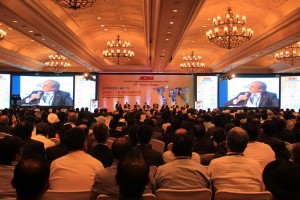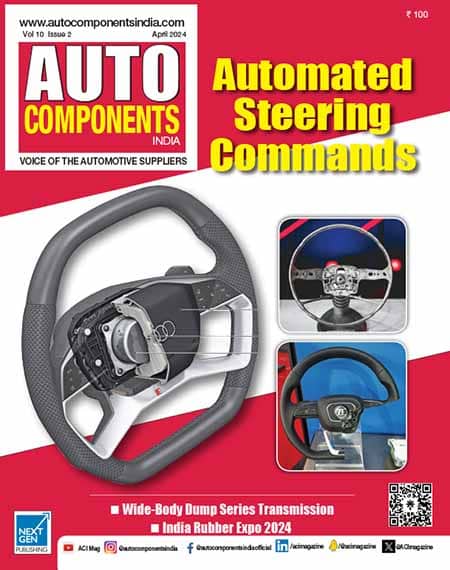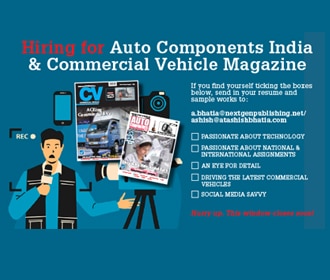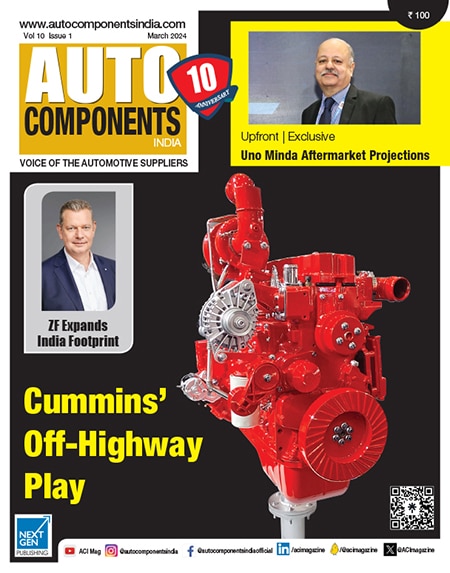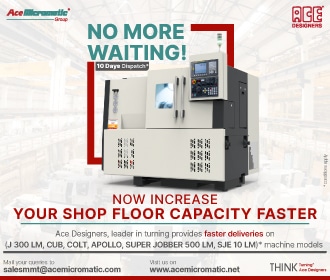Automotive Component Manufacturers Association of India (ACMA), the apex body of the Auto Component Industry in India, today hosted its 56thAnnual Session & National Conference.
ACMA’s Annual Session was addressed by key ministers and eminent leaders from the automotive industry which included Anant Geete, Hon’ble Union Minister for Heavy Industries & Public Enterprises, Government of India, Nitin Gadkari, Hon’ble Union Minister for Road Transport & Highways, Government of India, R C Bhargava Chairman, Maruti Suzuki India, Guenter Butschek, Chief Executive Officer& Managing Director, Tata Motors, Dr Naushad Forbes, President, CII & Co-Chairman, Forbes Marshall, Vinod K Dasari, President, SIAM & Managing Director, Ashok Leyland and Arvind Balaji, President, ACMA & Joint Managing Director, Lucas-TVS, Rattan Kapur, Vice President, ACMA & Chairman & Managing Director, Mark Exhaust Systems Ltd.
ACMA’s study conducted by McKinsey & Co. themed “Winning with Quality and Innovation” was released by Anant Geete, Hon’ble Union Minister for Heavy Industries & Public Enterprises. The study reveals that the auto component industry, in order to stay competitive, will be required to develop capabilities for in-house design, harness frugal engineering and create product differentiation through innovations. A move towards product & process innovation and organisation wide culture of quality and innovation will be integral to this change.
On the occasion, Anant Geete, Hon’ble Union Minister for Heavy Industries & Public Enterprises, said, “the auto-component industry, has displayed excellent performance in the last decade. The growth has generated tremendous employment opportunities for India’s population, of which youth are 55 percent. Since, the automotive industry will be the primary contributor to the growth of manufacturing sector and to the ‘Make in India’ programme. Therefore, we will help resolve all issues and concerns of the automotive industry by givingit our full support. With implementation of GST, it will further boost the prospects of the industry.”
Nitin Gadkari, Hon’ble Union Minister for Road Transport & Highways, Government of India, said, “this year the automotive industry had a satisfactory performance achieving an overall growth of 8 percent with exports of Rs. 70,000 crore. In coming years the government’s focus will be to adopt economic policies that are conducive to the growth of the industry and help strengthen exports. Innovation, technology and quality will be the three main pillars for industries competitiveness. We have the potential to grow exponentially from the current Rs. 4.5 lakh crore to Rs. 20 lakh crore in the next 10 years, making us one of the world’s foremost.
Emphasising on the road map for the auto component industry, Arvind Balaji, President ACMA said, “The Indian Auto Component industry is at a point of inflection, quality and technology will be the key differentiators for industry’s competitiveness. Globally, the automobile landscape is undergoing a rapid change with the integration of digital and intelligent technologies in vehicles, much higher consideration for environment protection, reduction of fossil fuels, enhancement of safety features and changing user preferences. Additionally, concept of digitization of the manufacturing sector is fast emerging. Changes such as these and others will have to be addressed by the auto component industry by investing significantly in R&D and creation of new products.”
Further, as OEMs consolidate their platforms as also their supply base, globalisation is an imperative for the component sector, not only for reasons of competitiveness but also for survival, added, Balaji.
Expressing optimism, Rattan Kapur, Vice President, ACMA & Chairman & Managing Director, Mark Exhaust Systems, said, “we as an industry have to graduate from one that merely ‘builds from print’ to one that ‘innovates and experiments’. To achieve this,the component industry needs to strengthen its relation with its customers’ i.ethe OEMs to become co-development partners. This calls for ‘sharing-risks’ in new areas especially those related to technology and product development.”
In his keynote address, RC Bhargava, Chairman, Maruti Suzuki India Ltd, emphasised, “the auto component manufacturers need to have a singular focus to scale up their businesses with quality and technology as the bedrock. The industry needs to invest in design and capability, as also in world class testing and manufacturing facilities, improve profitability of operations to order to become integral to the global supply chains.”
Speaking on the theme of Quality and Innovation, at the 56th ACMA National Conference, Guenter Butschek, MD&CEO, Tata Motors, said, “The Indian auto industry is going through a very dynamic phase and is witnessing a dramatic shift in landscape for the auto components industry. Quality and Innovation are the cornerstones for success in today’s business environment and at the core of Tata Motors’ new mission and vision, along with a continued focus on R&D investment in design and engineering. We at Tata Motors are looking to streamline our supply chain operations and focus on suppliers with comprehensive capabilities and high performance levels in areas of technical know-how, quality, cost, delivery and financial health. We will be rolling out a new supplier capability assessment process with the intention to bring synergies and efficiencies in the whole ecosystem and create win-win situations for both, Tata Motors and the supplier fraternity.”
McKinsey’s research shows that Culture is the most critical dimension of quality wherein 30 percent of quality outcomes are linked to culture. Contrary to popular belief, culture of quality can be created in all organizations regardless of age and size. However, culture shifts are not possible without leadership’s commitment to quality.The research also shows that the auto supplier industry will evolve with the following emerging trends which will benefit the industry:
- Electrification – 65% of global new passenger vehicles will be hybrid or electric by 2030
- Connectivity – 50 percent vehicles will have integrated infotainment units by 2030
- Autonomous driving – 300 million lines of software code per vehicle by 2030
- Advanced manufacturing – 20 percent reduction in cost of poor quality over 10 years driven by precision manufacturing
- Emissions – Tightening regulations will drive efficient powertrains
- Electronics – 45 percent of car value will be electronics by 2030
- Advanced materials – 60 percent share of lightweight materials by 2030
The 56thAnnual Session & National Conference concluded on a high note witnessing over 1200 participants. Eminent speakers from industry and government graced the event including Girish Shankar, Secretary Department of Heavy Industry, Government of India, Rajan Wadhera, President & Chief Executive Truck & Powertrain, Head – Mahindra Research Valley, Mahindra& Mahindra, C V Raman, Executive Director (Engineering), Maruti Suzuki India, Dr Christian Brenneke, Vice- President – Product Engineering, WABCO Inc. and Mr Malo Le Masson Head – Global Product Planning, Hero MotoCorp and David Keeling, Senior Partner, McKinsey & Company, India and Shivanshu Gupta, Partner, McKinsey & Company, who dwelled on the steps that component industry requires to take in order to become the preferred suppliers of choice for OEM’s, create greater value proposition and transform from being local players to truly global players, thus becoming integral to the global automotive supply chains.
